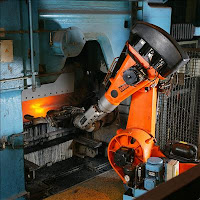So, we have a glimpse of the future and we have people we trust telling us that we will be able to steer our own destinies in ways that our limited imaginations can not yet fathom.
But wait... surely our passport to utopia is going to have to be rubber-stamped by the ruling bodies that usually fund and thus own technological development. Most people would accept that it is humanity's most base instincts that often lead in this respect, namely
fear of domination and the motivation to strike them before you get struck. And when
government agencies are in control of technological innovation, they tend to pander to these fears by looking first at defense programmes.
Following this line of thought, it's not hard to envision the network of corporate industrial concerns that lie behind manufacturing the new technology that our governments tell us our safety depends on. Basically, the latest technologies are often sponsored for
military purposes and behind them is an expansive paper trail that catalogues contracts and mega-profits for captains of industry.
It's very refreshing to hear what the
utopians and runaway optimists have to say... and no doubt many futurists and transhumanists would prefer to keep their heads in the sand when it comes to referencing notable technological advances of the past that were ultimately deployed with such
dubious intentions.
One of the evident positives here is that the singularity will affect us both as a species and as individuals... and all of us, even global leaders and industrial chiefs, stand as individuals when it comes to facing a future that may see us relieved of the hitherto unquestioned necessities of physicality and survival. Indeed, in the accelerated age, notions of leadership, dominance and control may become distant concerns; washed away in the sudden realisation that we will have no need to fight each other to survive… as we will all be masters, with only the confines of the metaverse to hold us back.



 Jung's archetypes exist within the universal
Jung's archetypes exist within the universal 




